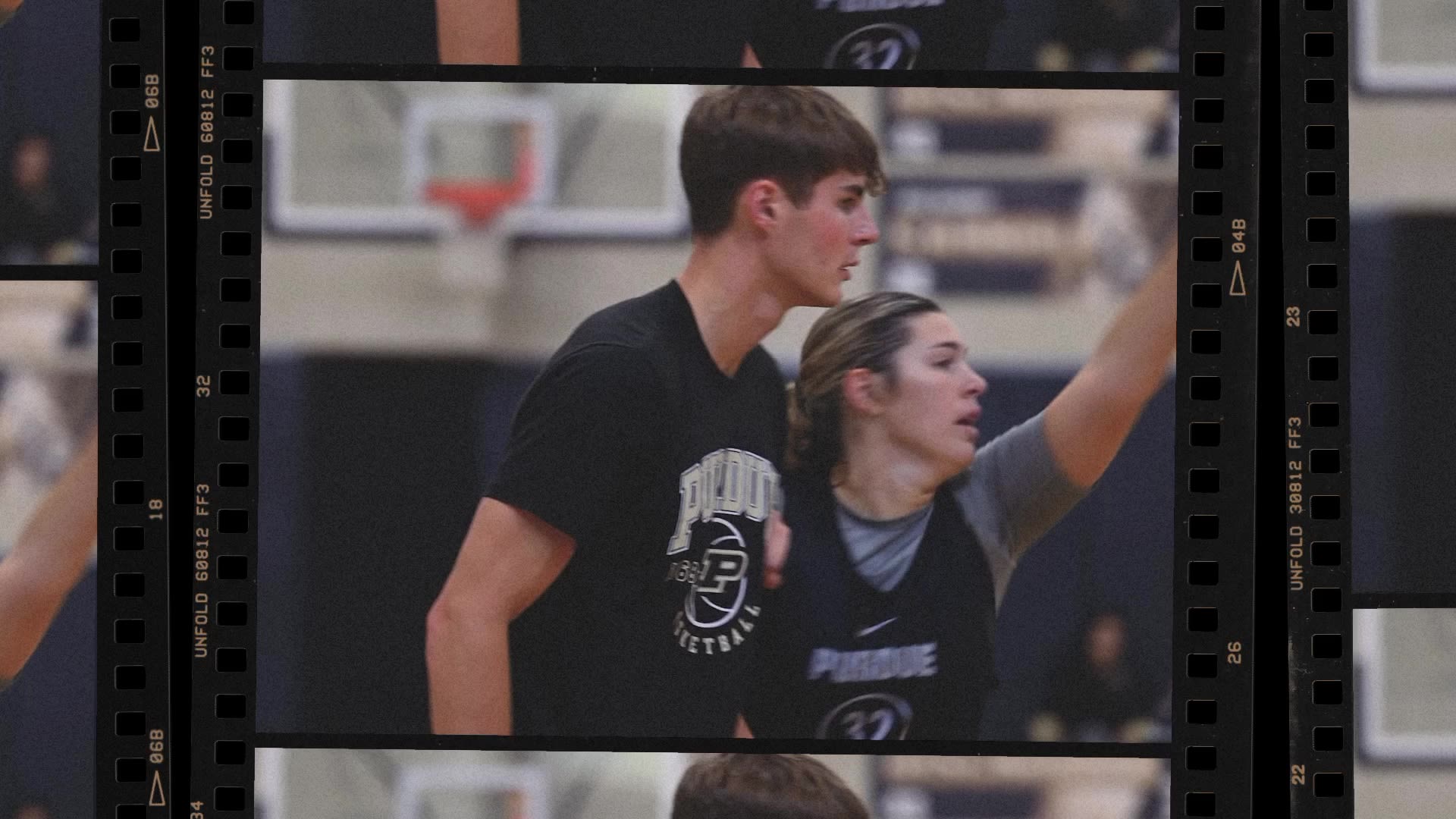
When Matt Collins drives to the basket and sinks a layup in Mackey Arena, he hears the thunderous roar of the crowd echoing across the rafters.
Often cited as the loudest arena in the Big Ten, nothing pumps a player up like the electric atmosphere created by 10,000-plus screaming fans on their feet. If it was a particularly challenging play, Collins might even throw a little celebration in to stoke the competitive juices of the opposing team.
The crowd Collins imagines isn’t real.
The competition isn’t real.
But his commitment to playing at an elite level to simulate a game-day environment is very real.
The senior majoring in elementary education from Valparaiso, Indiana, is one of 15 members of the RIP (Ready, Intense, Practice) Squad, the men’s practice team that volunteers to train with Purdue women’s basketball and prepare the Boilermakers for competition.
“Any time we can simulate what the other team is doing, it really benefits our players’ understanding of the game plan,” says Katie Gearlds (LA’07), head coach of women’s basketball. “It allows us to focus on ourselves offensively and defensively. When recruiting for RIP Squad, we find physically gifted and talented players who imitate some of the best players in the country every day for us.”
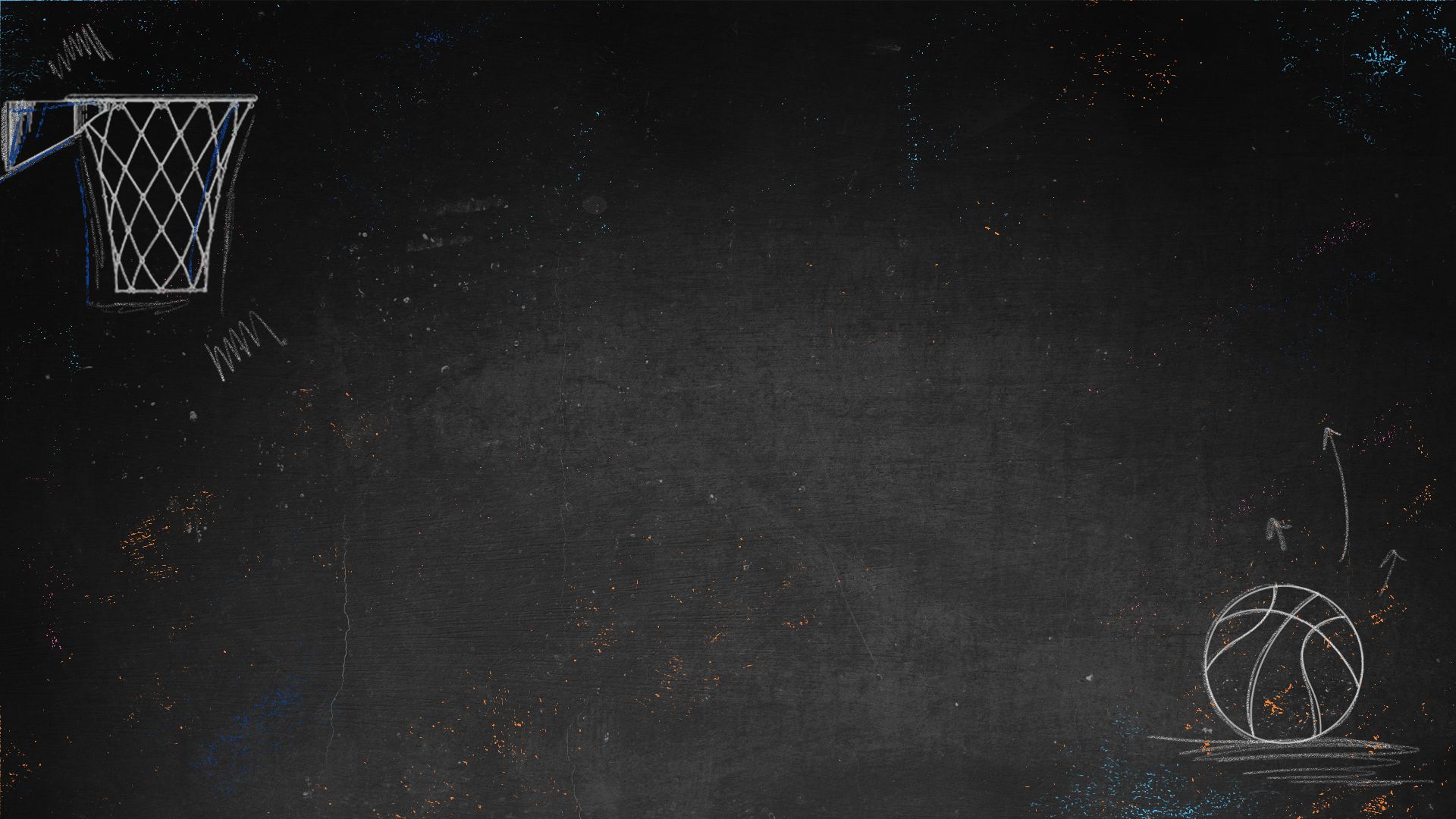
THE ROAD TO RIP SQUAD
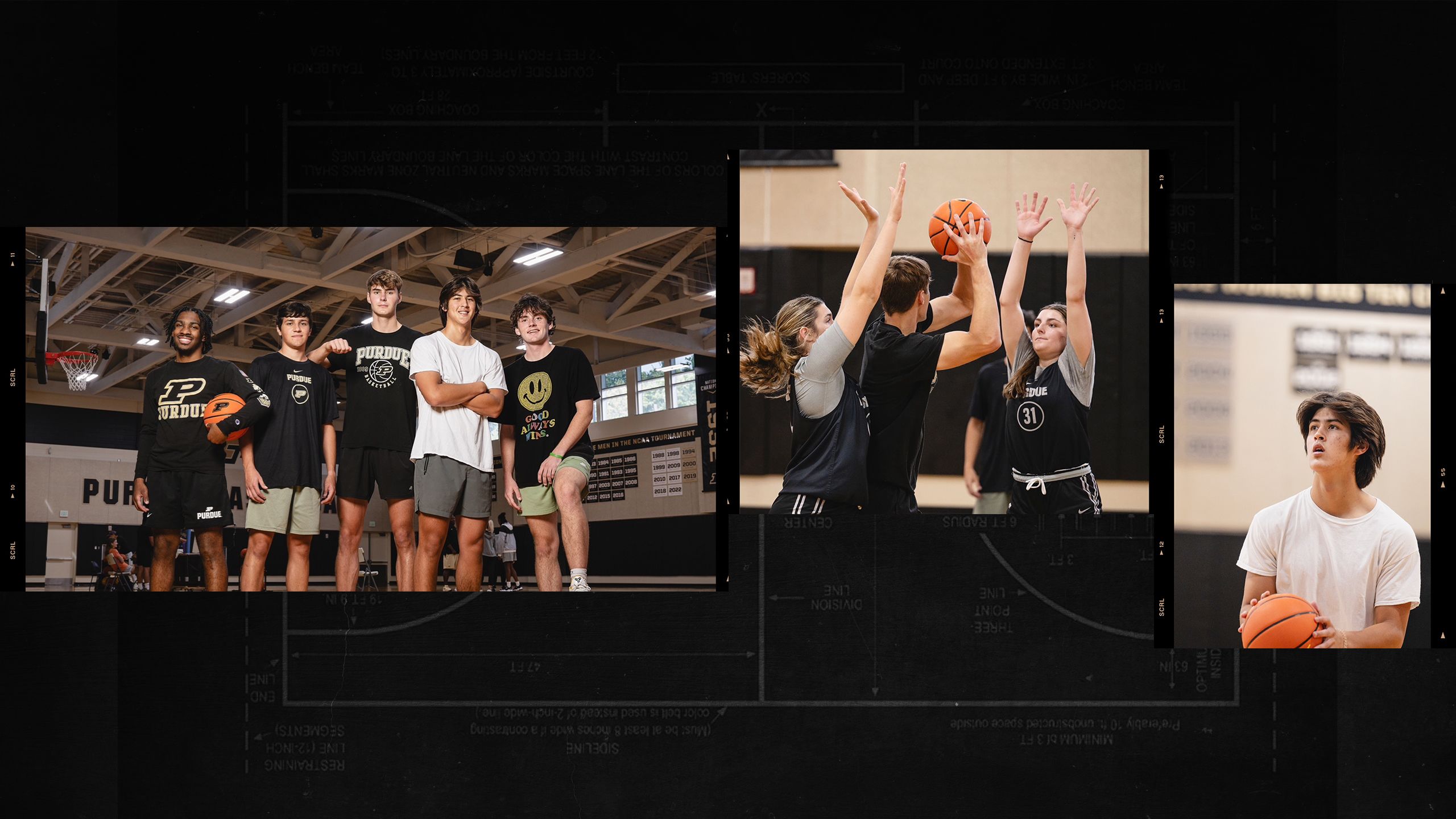
Like many young boys growing up in Indiana, Jaelen Nice (A’21, MS T’23) dreamt of one day playing college hoops. Unlike most young boys, in sixth grade, he set a goal and laid out a plan for achieving his dream.
Nice had already been running drills with his mom in the driveway since kindergarten. She’d draw out a grid on the pavement with numbers and letters, and he’d dribble the ball to the correct location to solve small math problems or spell out simple words. When Nice got the answer right, he could take a shot.
“My mom mixed academics and athletics, ensuring I understood that both were important and both needed to be worked at,” Nice says.
“I was eager to get the answer right because I wanted to shoot, but she never let me shoot with bad form. I can’t tell you how many form shots I took as a little kid. It drove me nuts, but I guess it paid off.”
By eighth grade, Nice had started weight lifting regularly and began to stand out on his middle school team. Coming out of his sophomore year of high school, he committed to 6 a.m. gym sessions to practice shooting at least an hour a day, sometimes more.
The hard work was worth it. Nice was ranked in the top 20 in the state for three-point field goal percentage as a star player for Salem High School in Salem, Indiana. He began receiving invitations to prospect camps.
His dream to play college ball came true—Nice was recruited to play for Anderson University, a Division III school in Anderson, Indiana. Despite his love for the sport and achieving everything he thought he wanted, Nice felt adrift at Anderson during his freshman year. His grandfather died during the first semester, and that sparked some inward reflection. Nice felt his priorities shifting.
“I just didn’t feel like myself, and playing basketball wasn’t as fun as it used to be,” Nice says. “I’ve never been one to quit anything, so the decision to transfer schools was hard. But when I reflected on my long-term goals, Purdue offered more research opportunities for my biochemistry major. I decided to focus on my education a little more.”
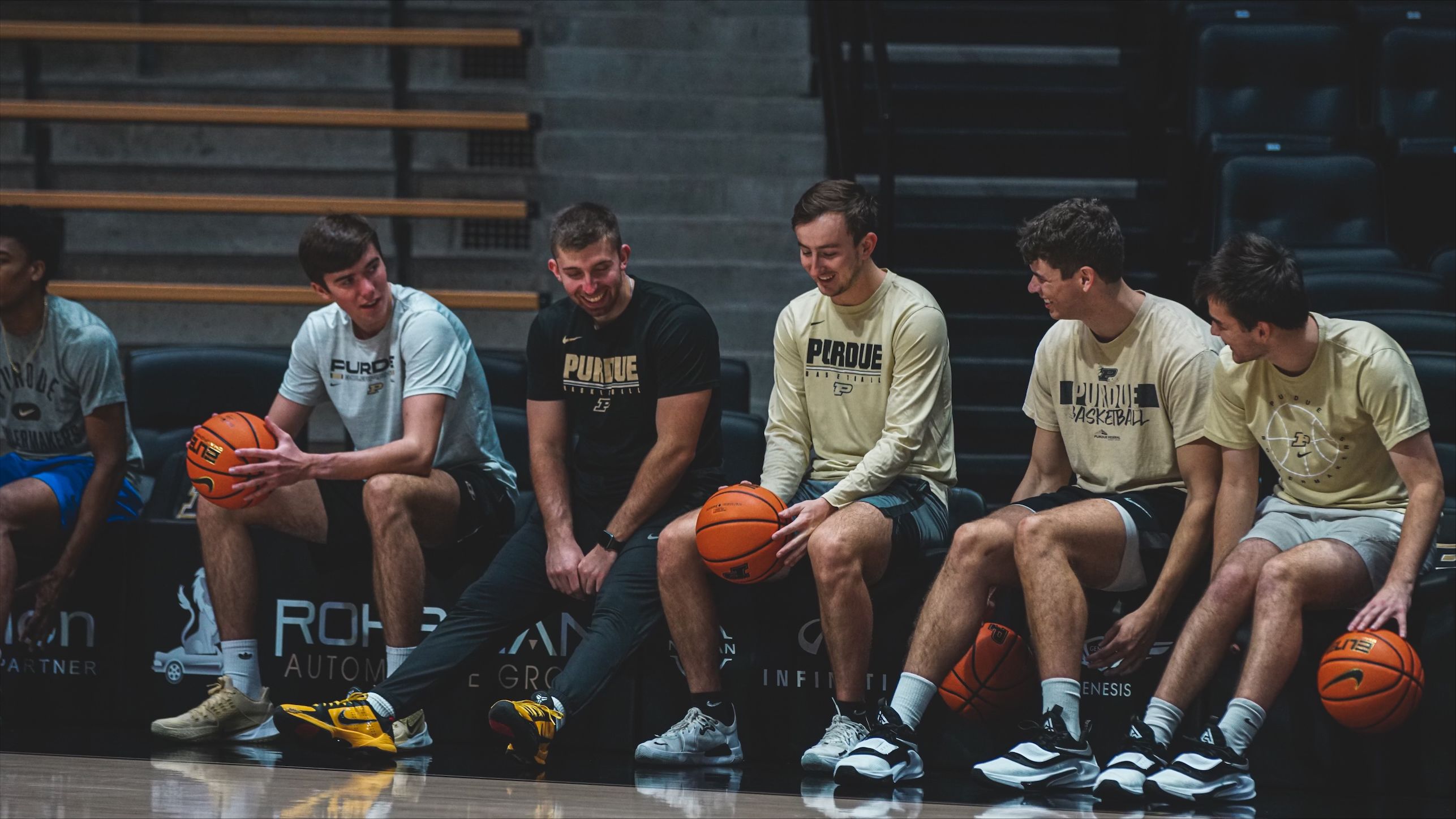
The motivation to play was still there. Nice trained all summer hoping to get a walk-on trial with the Purdue men’s basketball team. That opportunity didn’t materialize, and Nice spent his sophomore year missing the sport. Junior year, he tried out for the RIP Squad and made the team.
“I loved being a part of RIP Squad,” says Nice, who played from 2018 to 2021 and then coached the team as a graduate assistant for Coach Gearlds from 2021 to 2023.
“It felt great to give my time and effort while still being a part of a team and playing a sport I love. I have no regrets about how things unfolded.”
And Nice doesn’t feel like all those early morning workouts were for naught. “I still lived out a basketball journey that allowed me to play in Mackey,” he says. “I’d be in the stands on game day and think, ‘I just practiced on that court two hours ago.’ As a GA, I went to every arena in the Big Ten. Being on that practice squad and having those experiences trumps what I had as a DIII player, without a doubt.”
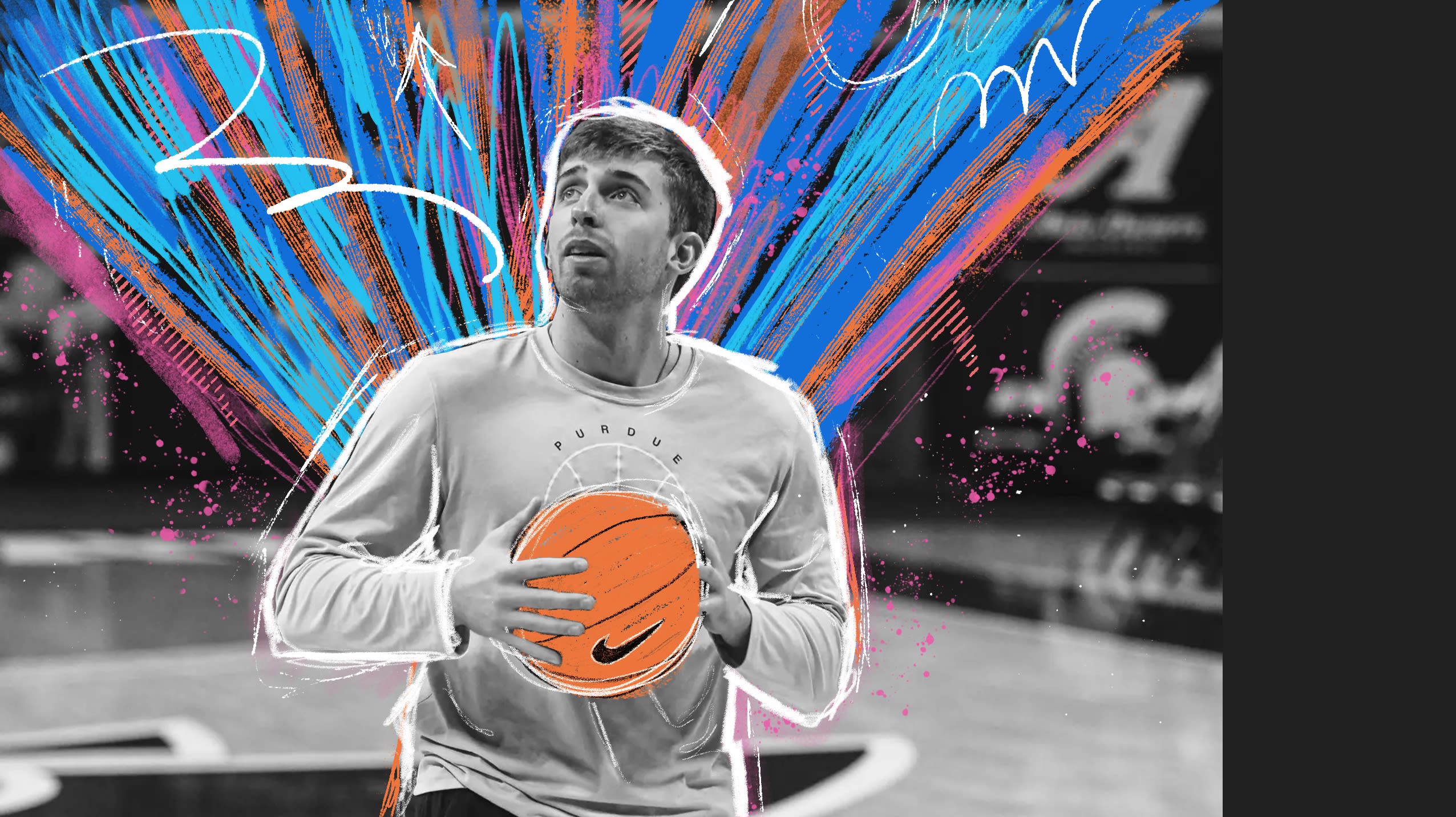
Like many young boys growing up in Indiana, Jaelen Nice (A’21, MS T’23) dreamt of one day playing college hoops. Unlike most young boys, in sixth grade, he set a goal and laid out a plan for achieving his dream.
Nice had already been running drills with his mom in the driveway since kindergarten. She’d draw out a grid on the pavement with numbers and letters, and he’d dribble the ball to the correct location to solve small math problems or spell out simple words. When Nice got the answer right, he could take a shot.
“My mom mixed academics and athletics, ensuring I understood that both were important and both needed to be worked at,” Nice says.
“I was eager to get the answer right because I wanted to shoot, but she never let me shoot with bad form. I can’t tell you how many form shots I took as a little kid. It drove me nuts, but I guess it paid off.”
By eighth grade, Nice had started weight lifting regularly and began to stand out on his middle school team. Coming out of his sophomore year of high school, he committed to 6 a.m. gym sessions to practice shooting at least an hour a day, sometimes more.
The hard work was worth it. Nice was ranked in the top 20 in the state for three-point field goal percentage as a star player for Salem High School in Salem, Indiana. He began receiving invitations to prospect camps.
His dream to play college ball came true—Nice was recruited to play for Anderson University, a Division III school in Anderson, Indiana. Despite his love for the sport and achieving everything he thought he wanted, Nice felt adrift at Anderson during his freshman year. His grandfather died during the first semester, and that sparked some inward reflection. Nice felt his priorities shifting.
“I just didn’t feel like myself, and playing basketball wasn’t as fun as it used to be,” Nice says. “I’ve never been one to quit anything, so the decision to transfer schools was hard. But when I reflected on my long-term goals, Purdue offered more research opportunities for my biochemistry major. I decided to focus on my education a little more.”

The motivation to play was still there. Nice trained all summer hoping to get a walk-on trial with the Purdue men’s basketball team. That opportunity didn’t materialize, and Nice spent his sophomore year missing the sport. Junior year, he tried out for the RIP Squad and made the team.
“I loved being a part of RIP Squad,” says Nice, who played from 2018 to 2021 and then coached the team as a graduate assistant for Coach Gearlds from 2021 to 2023.
“It felt great to give my time and effort while still being a part of a team and playing a sport I love. I have no regrets about how things unfolded.”
And Nice doesn’t feel like all those early morning workouts were for naught. “I still lived out a basketball journey that allowed me to play in Mackey,” he says. “I’d be in the stands on game day and think, ‘I just practiced on that court two hours ago.’ As a GA, I went to every arena in the Big Ten. Being on that practice squad and having those experiences trumps what I had as a DIII player, without a doubt.”

WHAT IT TAKES TO PREP THE BEST
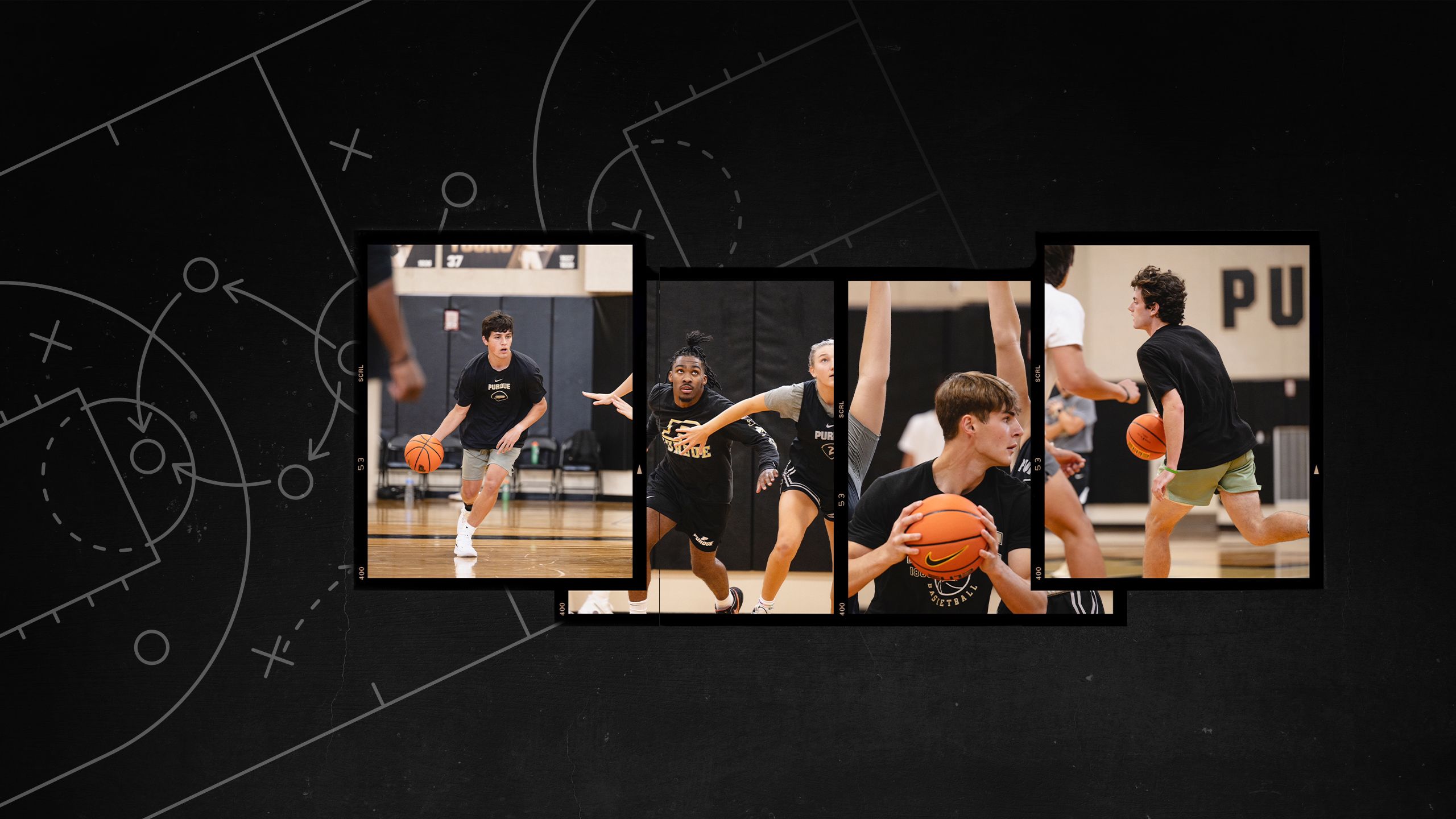
During the season, Caleb Frady suits up for practice six days a week. The practices typically last two and a half hours, and sometimes guys stay afterward to help players work on specific skills. Because the RIP Squad is comprised of student volunteers, members attend practices as their schedules allow.
The six-foot-five Frady, a senior finance major from Bloomfield, Indiana, likes to go as often as he can. Every week, the RIP Squad members receive scouting reports from the GA based on the team the women are scheduled to play. It’s the squad’s job to emulate those specific opposing players’ skills and style of play as closely as possible.
“Because of my height and strength, I’m usually playing as center or power forward,” Frady says.
“I learn which spot on the court that particular player likes to shoot from, where they like to rebound from, and certain moves they tend to make—then I just mimic that as best as I can.”
When he tried out for RIP Squad his junior year, Frady was one of 50 or 60 men competing for five or six spots on the practice team. Nice was the GA managing the tryout and recruitment process then. In assessing potential RIP Squad players, he looked not only for guys who could pass and shoot but also those with high basketball IQ—the ability to assess any given situation for potential plays and adapt instinctively.
When speaking about the RIP Squad as a student-athlete in 2004, Gearlds told the Purdue Exponent, “If we can play against them, we can play against anybody in the country.”
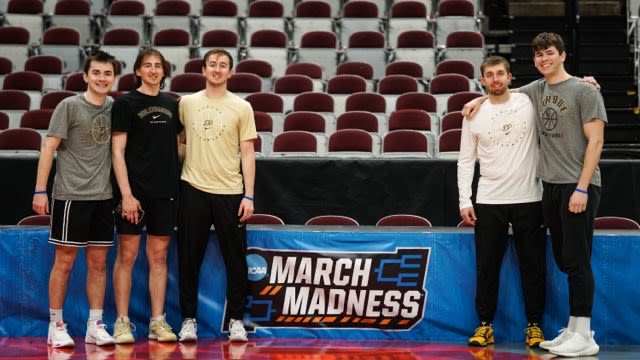
“I still feel that way,” Gearlds says. “When I played, the RIP guys always challenged me to be better. They helped me understand some of my weaknesses and helped me improve those areas of my game. They made life really hard for me and emulated how other teams would get in my space. We ask the exact same thing of our guys now to help our players prepare and develop.”
While squad members aren’t compensated for their time, they do receive some perks, including after-practice meals in the athletic dining facility and Purdue basketball gear. They also receive access to both Keady Court and Cardinal Court, an oversized practice facility with a full basketball court and three breakout shooting areas. RIP Squad members frequently play pickup games with former Purdue men’s basketball players and team managers.
“I just love basketball,” Frady says. “Being around the sport, all the people you get to meet—it’s insane. I’m good friends with a lot of the players on the men’s and women’s teams that I wouldn’t even know had I not been on RIP Squad.”
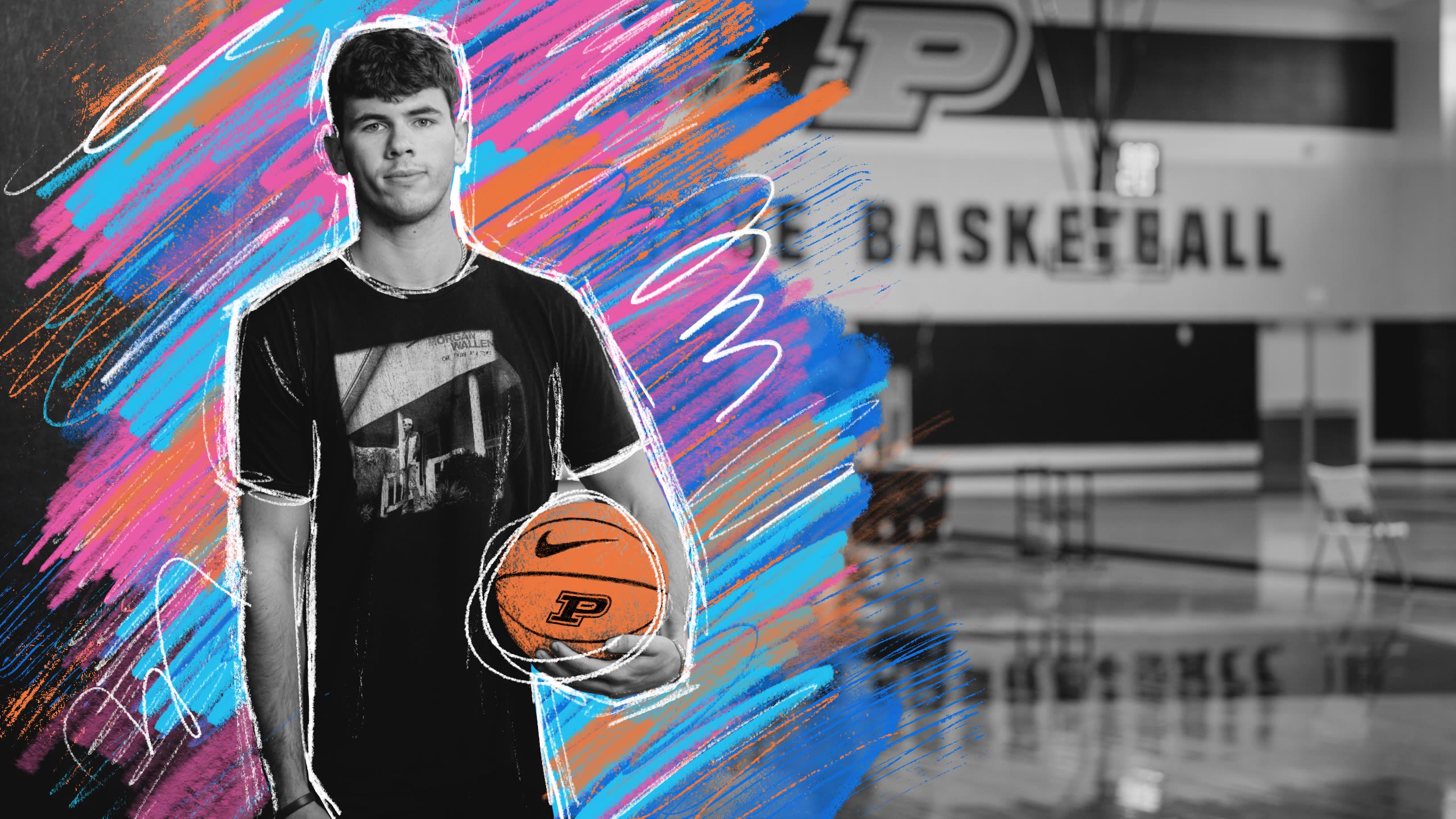
During the season, Caleb Frady suits up for practice six days a week. The practices typically last two and a half hours, and sometimes guys stay afterward to help players work on specific skills. Because the RIP Squad is comprised of student volunteers, members attend practices as their schedules allow.
The six-foot-five Frady, a senior finance major from Bloomfield, Indiana, likes to go as often as he can. Every week, the RIP Squad members receive scouting reports from the GA based on the team the women are scheduled to play. It’s the squad’s job to emulate those specific opposing players’ skills and style of play as closely as possible.
“Because of my height and strength, I’m usually playing as center or power forward,” Frady says.
“I learn which spot on the court that particular player likes to shoot from, where they like to rebound from, and certain moves they tend to make—then I just mimic that as best as I can.”
When he tried out for RIP Squad his junior year, Frady was one of 50 or 60 men competing for five or six spots on the practice team. Nice was the GA managing the tryout and recruitment process then. In assessing potential RIP Squad players, he looked not only for guys who could pass and shoot but also those with high basketball IQ—the ability to assess any given situation for potential plays and adapt instinctively.
When speaking about the RIP Squad as a student-athlete in 2004, Gearlds told the Purdue Exponent, “If we can play against them, we can play against anybody in the country.”

“I still feel that way,” Gearlds says. “When I played, the RIP guys always challenged me to be better. They helped me understand some of my weaknesses and helped me improve those areas of my game. They made life really hard for me and emulated how other teams would get in my space. We ask the exact same thing of our guys now to help our players prepare and develop.”
While squad members aren’t compensated for their time, they do receive some perks, including after-practice meals in the athletic dining facility and Purdue basketball gear. They also receive access to both Keady Court and Cardinal Court, an oversized practice facility with a full basketball court and three breakout shooting areas. RIP Squad members frequently play pickup games with former Purdue men’s basketball players and team managers.
“I just love basketball,” Frady says. “Being around the sport, all the people you get to meet—it’s insane. I’m good friends with a lot of the players on the men’s and women’s teams that I wouldn’t even know had I not been on RIP Squad.”

THE TEAM'S BIGGEST FANS
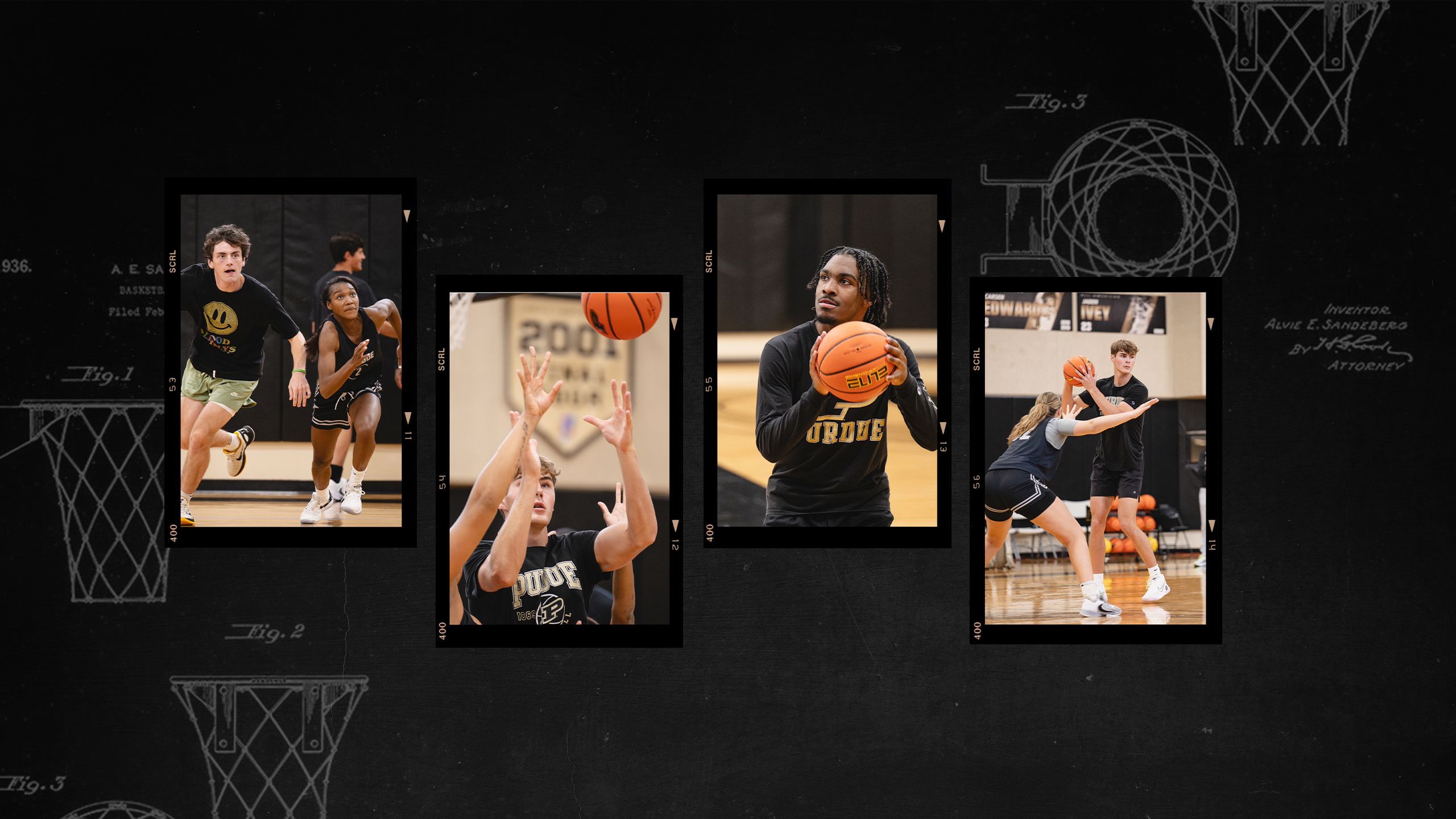
Like Frady, Collins is in his second year on the squad. Last fall, he traveled with the team to UCLA for the season opener as well as the Bahamas over Thanksgiving week for the Baha Mar Hoops Pink Flamingo Championship. Because the practice squad spends so much time with the team, they feel the winning highs and take the losses almost as hard as the players.
“We’re all big fans of the team,” Collins says. “It’s awesome to watch our friends win. After losses, it just makes you want to keep working.
“When the women’s team beat No. 2 Ohio State in January 2023, the first thing I thought was, ‘Wow, they’re about to make the NCAA tournament.’ It was their first time in the tournament in several years, so that was exciting. Obviously, the team puts in all the hard work, but knowing we helped them prepare even a little bit makes it really fun to watch them succeed.”
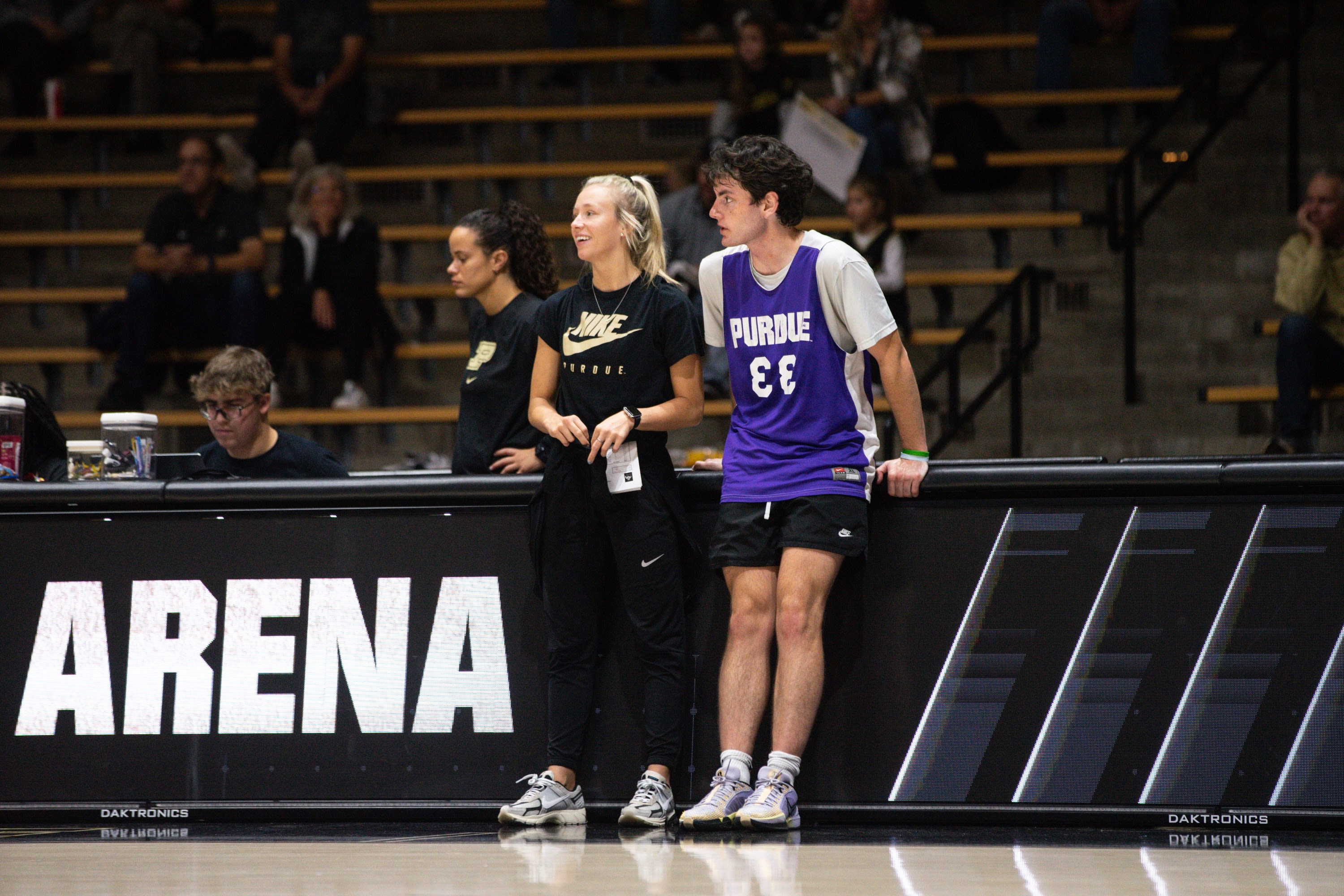
The RIP Squad experiences some victories, too. During the 2022–23 season, they played against Indiana University’s practice team twice—once in Mackey and once in Assembly Hall. Both times, the RIP Squad won.
“We beat them pretty bad,” Collins says. “As great as it feels to be two for two against IU, I would trade those wins in a second if that meant the women’s team could have beat IU twice last season. Those were games we all really wanted.”
After completing his graduate studies at Purdue, Nice returned to his hometown of Salem, Indiana, where he’s now a science teacher and coach of the boys varsity basketball team at Salem High School. His lifetime commitment to the sport has led him to a position where he can help a new generation of players realize their athletic dreams.
“One of the greatest things about participating in sports is being a part of a team so much bigger than yourself,” Nice says.
“I’m honored for the opportunity to give back to a town that poured so much into me. I learned so much as a part of the RIP Squad from the coaches and the players. Even though I’m no longer on campus, I’m still cheering on the women’s team. No matter how you’re connected, Purdue basketball is like one big family.”
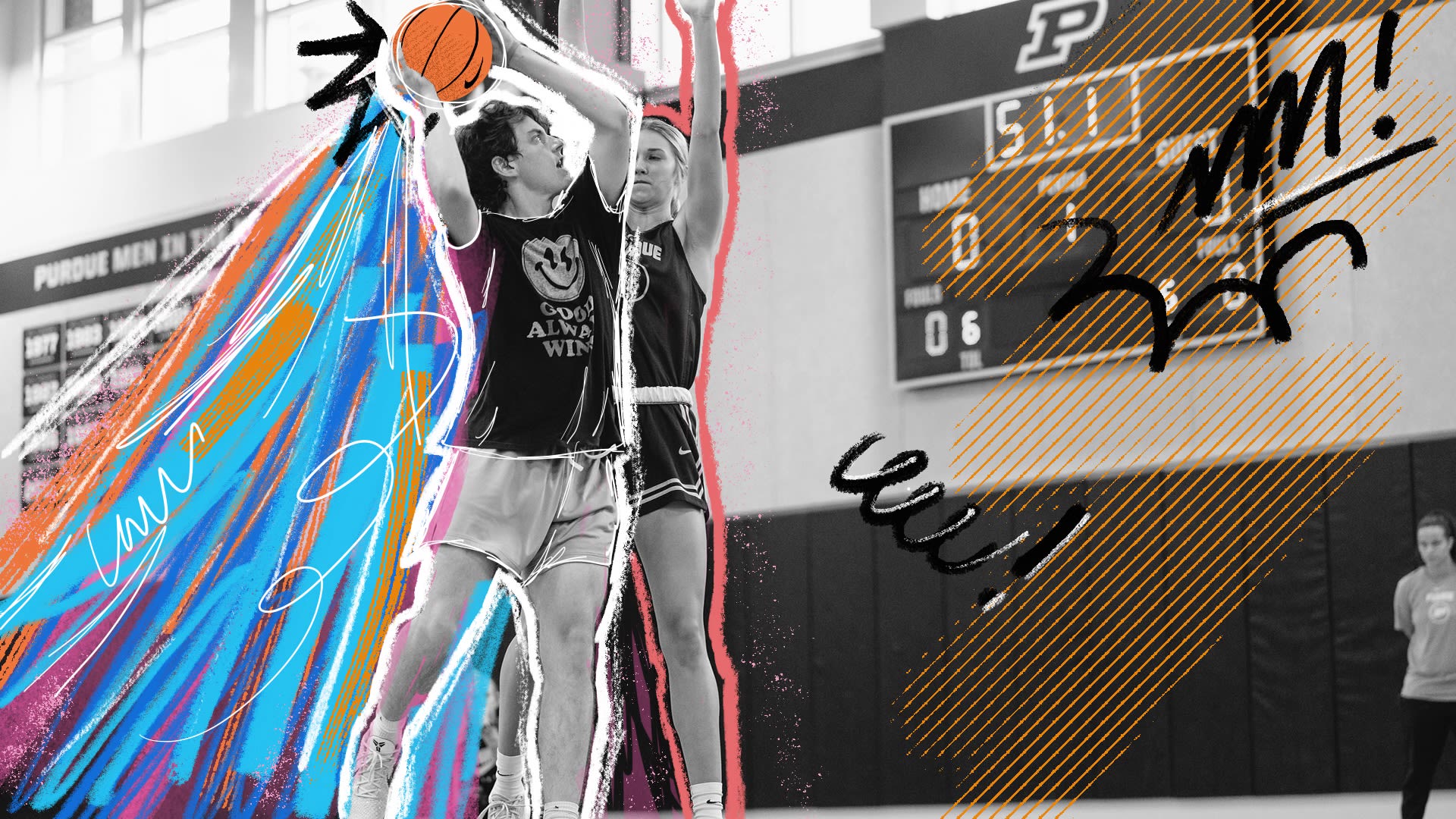
Like Frady, Collins is in his second year on the squad. Last fall, he traveled with the team to UCLA for the season opener as well as the Bahamas over Thanksgiving week for the Baha Mar Hoops Pink Flamingo Championship. Because the practice squad spends so much time with the team, they feel the winning highs and take the losses almost as hard as the players.
“We’re all big fans of the team,” Collins says. “It’s awesome to watch our friends win. After losses, it just makes you want to keep working.
“When the women’s team beat No. 2 Ohio State in January 2023, the first thing I thought was, ‘Wow, they’re about to make the NCAA tournament.’ It was their first time in the tournament in several years, so that was exciting. Obviously, the team puts in all the hard work, but knowing we helped them prepare even a little bit makes it really fun to watch them succeed.”

The RIP Squad experiences some victories, too. During the 2022–23 season, they played against Indiana University’s practice team twice—once in Mackey and once in Assembly Hall. Both times, the RIP Squad won.
“We beat them pretty bad,” Collins says. “As great as it feels to be two for two against IU, I would trade those wins in a second if that meant the women’s team could have beat IU twice last season. Those were games we all really wanted.”
After completing his graduate studies at Purdue, Nice returned to his hometown of Salem, Indiana, where he’s now a science teacher and coach of the boys varsity basketball team at Salem High School. His lifetime commitment to the sport has led him to a position where he can help a new generation of players realize their athletic dreams.
“One of the greatest things about participating in sports is being a part of a team so much bigger than yourself,” Nice says.
“I’m honored for the opportunity to give back to a town that poured so much into me. I learned so much as a part of the RIP Squad from the coaches and the players. Even though I’m no longer on campus, I’m still cheering on the women’s team. No matter how you’re connected, Purdue basketball is like one big family.”

